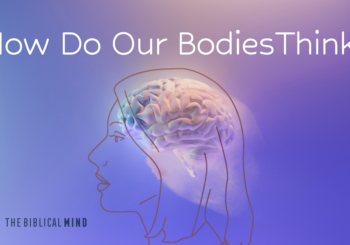Part of the 6 Jewish Thinkers All Christians Should Know series
The Moral Legacy of Rabbi Lord Jonathan Sacks: A Voice of Hope in the Conversation of Mankind
The day after I received the invitation to write this article about my teacher and rabbi Lord Jonathan Sacks—before I even had a chance to respond—Rabbi Sacks passed away. He ended his brief battle with cancer on November 7, 2020. He was 72. The extent to which he has been publicly mourned around the world, in diverse Jewish communities, and by many non-Jews impacted by his ideas, is a testament to the wide influence of his writings, speeches, and other activities. This has brought his family much comfort in their grief.
Enjoying this article? Read more from The Biblical Mind.
It is not my aim to eulogize him here (so many excellent obituaries can be found with a simple online search) but rather to present a window into the life and thought of the man and his legacy, and the broad appeal of his ideas beyond the Jewish world.
Jonathan Sacks: Philosopher, Spiritual Leader, Moral Voice
Rabbi Sacks was born in London’s East End, the son of immigrant and first generation Jewish parents. He was educated at Anglican elementary and secondary schools, and then read philosophy at Gonville & Caius College, Cambridge. Before graduating, he embarked on a spiritual journey that led him to private audiences with some of the leading American Orthodox rabbinic leadership of the generation, including Rabbi Joseph B. Soloveitchik and Rabbi Menachem Mendel Schneerson, the leader of the Lubavitch Hassidic dynasty.
These encounters ultimately changed the direction of his life. He chose to study for rabbinic ordination (while also completing postgraduate studies at New College, Oxford, and a PhD at King’s College, London).
He served as a community rabbi in London from 1978–1990, and was inducted as chief rabbi of the United Hebrew Congregations of the Commonwealth, a post in which he served until 2013. In this role, he served as a spiritual leader to the British Jewish community, as well as representing them to mainstream British society. He became a knight bachelor in the Queen’s 2005 Birthday Honours list for services to the Community and to Interfaith Relations, and in 2009 received a life peerage with a seat in the House of Lords.
Rabbi Sacks forged close friendships and influenced political and spiritual leaders across the world. These included the prime ministers serving during his time as chief rabbi, and several since then, including Tony Blair, Gordon Brown, David Cameron, and Boris Johnson, all of whom paid public tribute to him after his death.
He also had particularly close relationships with the three serving archbishops of Canterbury during this time: George Carey, Rowan Williams, and Justin Welby. But just as his influence in the Jewish world transcended the British Jewish community, spreading across the English speaking and non-English speaking Jewish world (including Israel), so his influence on world leaders, both political and religious, was widespread. Since his death, tributes have poured in, including from former vice president Mike Pence, Australian’s prime minister Scott Morrison, and the Dalai Lama.
A Book a Year for More Than Thirty Years
While Rabbi Sacks saw the invention of the internet as the “fourth of the great innovations in communication in our history” and understood it’s tremendous educational potential,1The Home We Build Together (2007), pp. 238–9. developing a strong online presence to spread his message, first and foremost he was an author. His books are where he developed his ideas and expressed them in his unique majestic eloquence. The Rabbi Sacks the world came to know was a prolific author, yet he admitted in a posthumously released audio interview from 2018 that he struggled for twenty years to write his first book, which he did not complete until he turned forty. He published one a year since then.
His published works were diverse in their themes and style, and reaching diverse audiences was always a top priority. His early books explored issues of Jewish philosophy, such as Tradition in an Untraditional Age (1990), and One People (1993). He continued to develop his ideas in more recent books, presenting his own philosophy of Judaism in A Letter in the Scroll (2001) and Future Tense (2009). He also tackled more universal religious issues from the perspective of Jewish philosophy, such as The Great Partnership: Science, Religion, and the Search for Meaning (2009), and Not in God’s Name: Confronting Religious Violence (2015). A more classic rabbinic genre of writing was equally comfortable and important to him. For example, his series of essays of biblical exegesis on the weekly Torah reading called Covenant & Conversation (2009–2019), and his liturgical commentaries, including the Koren Siddur (2009) and the Jonathan Sacks Haggada (2013).
But the genre that has perhaps had the greatest impact beyond the Jewish community are his titles of moral philosophy. These address contemporary issues facing wider society, where he magnificently weaves classical Jewish sources with a breathtaking breadth of secular wisdom, both classical and contemporary, creating his own unique moral voice. Examples include Politics of Hope (1997), The Dignity of Difference (2002), and his final book, Morality: Restoring the Common Good in Divided Times (2020).
The Thought of Rabbi Sacks: A Brief Overview
It is almost impossible to give a meaningful overview of a system of thought developed over thirty years in more than thirty books in just a few lines, but let me present a few core ideas central to his thought.
The dual themes of Universalism and Particularism run throughout his writings. “The human condition is universal, but the expressions of that condition are particular,”2Future Tense (2009), p. 80. Judaism being “the particular case that exemplifies the universal rule that the world exists under the sovereignty of God, and that every person is the image of God.”3A Letter in the Scroll (2001), p. 87. With this he critiqued political and religious systems that impose a universalism on society,4See Not in God’s Name (2015), p. 200. ignoring the Dignity of Difference, another recurring theme that features across his writings, culminating in a volume with that title, written in 2002 in response to 9/11, dedicated solely to developing this theme
This, he believed, is central to the national mission of the Jewish people: “God, the creator of humanity, having made a covenant with all humanity, then turns to one people and commands it to be different in order to teach humanity the dignity of difference.”5The Dignity of Difference (2002), p. 53. The unique Jewish message to humanity according to Rabbi Sacks is that the world can be better tomorrow than it is today, and that we all have a responsibility to make it so: “This was perhaps the greatest contribution of Judaism—via the Judaic roots of Christianity—to the West. The idea that time is an arena of change, and that freedom and creativity are God’s gift to humanity”6Future Tense (2009), p. 249. which has led to the Jewish people being “the voice of hope in the conversation of mankind.”7Ibid. p. 252. He was fond of quoting Thomas Cahill on this, who described the impact of Judaism on humanity:
The Jews gave us the Outside and the Inside—our outlook and our inner life. We can hardly get up in the morning or cross the street without being Jewish. We dream Jewish dreams and hope Jewish hopes. Most of our best words, in fact—new, adventure, surprise; unique, individual, person, vocation; time, history, future; freedom, progress, spirit; faith, hope, justice—are the gifts of the Jews.8Thomas Cahill, The Gift of the Jews, pp. 240–1.
To understand how Judaism is the voice of hope in the conversation of mankind, he would often contrast “optimism” with “hope”:
Optimism and hope are not the same. Optimism is the belief that the world is changing for the better; hope is the belief that, together, we can make the world better. Optimism is a passive virtue, hope an active one. It needs no courage to be an optimist, but it takes a great deal of courage to hope. The Hebrew Bible is not an optimistic book. It is, however, one of the great literatures of hope.9To Heal a Fractured World (2005) p. 166.
“Hope” for Sacks is predicated in taking responsibility as partners with God to “heal a fractured world” (the title of his 2005 book, written as a response to the conflicts taking place at the turn of the twenty-first century where religion often provided the fault lines if not the cause), or Tikkun Olam in Hebrew. The ethics of responsibility form a central element of his philosophy of Judaism, which he describes as Faith as Responsibility:
Judaism begins not in wonder that the world is, but in protest that the world is not as it ought to be. It is in that cry, that sacred discontent, that Avraham’s journey begins… the easy answer would be to deny the reality of either God or evil. Then the contradiction would disappear and we could live at peace with the world. But to be a Jew is to have the courage to refuse easy answers and to reject either consolation or despair. God exists; therefore life has a purpose. Evil exists; therefore we have not yet achieved that purpose. Until then we must travel, just as Avraham and Sarah travelled, to begin the task of shaping a different kind of world.10A Letter in the Scroll pp. 55.
In his 2007 book The Home We Build Together, written in response to what he perceived as the failure of multiculturalism in Europe to address social friction in society, he presented Covenantal Faith as set out in the Hebrew Bible as a vision and model for building a society based on these values (Social Covenant in contrast to Social Contract):
Covenants and contracts are different things and address different aspects of our humanity. In a contract, what matters is that both gain. In a covenant, what matters is that both give. Contracts are agreements entered into for mutual advantage . . . covenants are moral commitments. . . . Social contract creates a state; social covenant creates a society. Social contract is about power and how it is to be handled within a political framework. . . . Social covenant is about moral commitments, the values we share and the ideals that inspire us to work together for the sake of the common good.11The Home We Build Together, (2007) pp. 109–110.
In his final book (2020), Morality: Restoring the Common Good in Divided Times, published just months before his death, he identifies a steady movement in society away from these values over the last seventy years, what he terms the move from “We” to “I,” and the catastrophic impact this has had on the individual and on society. He argues that:
societal freedom cannot be sustained by market economics and liberal democratic politics alone. It needs a third element: morality, a concern for the welfare of others, an active commitment to justice and compassion, a willingness to ask not just what is good for me but what is good for all-of-us-together.12Morality (2020), p. 1.
In interviews promoting the book which took place during the coronavirus pandemic, he shared that he had no idea the book would prove to be prophetic in such a way, describing phenomena in society that are all too painfully coming to the fore before our eyes. Although the book paints a damning and depressing picture of society today, of course it ends with a message of hope (rather than optimism!): “But we can change. Societies have moved from ‘I’ to ‘We’ in the past. They did so in the nineteenth century. They did so in the twentieth century. They can do so in the future. And it begins with us.”13Ibid. p. 336.
Some Final Personal Reflections on Rabbi Jonathan Sacks
If I may, I would like to conclude here with a more personal reflection on who Rabbi Sacks was as a person and the impact he has had on my life. I first fell in love with his ideas when I was an 18-year-old high school graduate studying in a Yeshiva in Israel. While I was immersed in the minutiae of Talmudic and Halakhic Jewish texts (and loving it I might add), I was also desperate for a “Big Picture Judaism” and he provided it for me. I thirsted for his writings, which expressed the core ideas of Judaism in a poetic and eloquent, simple and yet sophisticated manner. The Judaism he taught was one engaged with the modern world, a Judaism that had an eternal and relevant message for wider society. A Judaism that I was proud of. That burned inside me. That I longed to be part of and to live up to.
But there was more to him than that. Since his death hundreds of stories have been shared about the man himself, the religious and ethical role model he was, the access he gave to people, the conversations and letters and gestures that changed lives. The extent to which he has impacted so many thousands of people in a personal way has been a revelation and deeply comforting to his family.
This is proof, if we needed it, that he was not a scholar who cut himself off from the outside world in an ivory tower of scholarship. He was a man of the people, a leader par excellence, and a mensch of the highest order. He was a man of immense humanity and warmth, expressed in his humour, and in his drive to always do and say the right thing to those he met and interacted with.
In the Covenant & Conversation essay for the Torah reading of Chayei Sarah, which fell on the Shabbat after he died, Rabbi Sacks explored Abraham’s faith in the covenant he had made with God, despite only experiencing the very beginning of its fulfillment in his lifetime. Rabbi Sacks concluded the essay with these words: “Leaders see the destination, begin the journey, and leave behind them those who will continue it. That is enough to endow a life with immortality.”
Rabbi Sacks deeply influenced me as a Jew, as an educator, and as a human being. I not only feel deep loss, but I also feel lost, missing my anchor and compass. But I also feel driven to continue his work. I hear these words as a call to us all to continue his work, to ensure his legacy, and to “endow his life with immortality” by building a world in the image of his ideas and values.
End Notes
1. The Home We Build Together (2007), pp. 238–9.
2. Future Tense (2009), p. 80.
3. A Letter in the Scroll (2001), p. 87.
4. See Not in God’s Name (2015), p. 200.
5. The Dignity of Difference (2002), p. 53.
6. Future Tense (2009), p. 249.
7. Ibid. p. 252.
8. Thomas Cahill, The Gift of the Jews, pp. 240–1.
9. To Heal a Fractured World (2005) p. 166.
10. A Letter in the Scroll pp. 55.
11. The Home We Build Together, (2007) pp. 109–110.
12. Morality (2020), p. 1.
13. Ibid. p. 336.
Subscribe now to receive periodic updates from the CHT.





